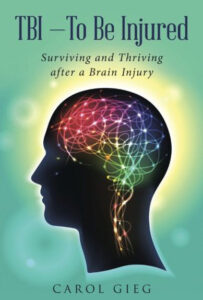A few weeks ago, my husband, Luis, had his (every six months) follow-up visit with the neurologist regarding “rapidly progressing, early onset” dementia.
At the time of that specific diagnosis being made (though “dementia” was diagnosed earlier) he had, “one and a half to two years left and the end won’t be pretty.” I had to hear it again at the next appointment to believe it. (You know what they say about that river in Egypt ?.)
That was 3 years ago. He now reportedly has years left. Some of those years will be hard to bear, but, nonetheless.
His medications haven’t changed and I asked the doctor if what I have been doing with him has been helping. Yes!!! It is “slowing the progression.”
Since there have been no changes in his medications (short of blood pressure), the latter makes sense.
He is surviving longer at least in part because of those who love him and help me to practice the variables I described in my book TBI-To Be Injured – Surviving and Thriving after a Brain Injury.
All that is to say, research I discussed in the introduction of my book, has proven certain practices enhance brain function and reduce the risk of developing dementia. (For those with brain injury and those who are healthy, new neural pathways can be established and even regeneration of neurons.) Please! I’m not naïve enough to believe any of this will cure him!
Here is the list of variables I hope you will wind into your daily lives:
- Socialization
- Challenging the brain. He still can play chess, Chinese checkers, and help me with cooking… thank goodness! (So I don’t kill us!)
Yes, it’s strange what he can and can’t do still. The brain is like a muscle. It needs to be exercised in order to stay healthy. - Some form of meditative and or spiritual practice (I meditate every day and have a sustaining faith). (I guide him through prayers daily. He is limited in his understanding, though has a good feeling when I describe it as loving others).
- Standard recommendations as to health including no smoking, healthy diet, moderate alcohol (though we have chosen none).
I would add a healthy daily dose of Omega-3s (salmon or ground flaxseed) and sea vegetables (only food which provides a full array of trace minerals so necessary for neural functioning). - And, most important by far is exercise! We walk many miles a day and I still enjoy the elliptical. This is essential for caregivers’ survival too. I know that both diabetes and dementia rates are skyrocketing and I’ll just bet some of that is due to our sedentary lifestyle in this society.
I’m not naïve about his destination, but, as with the brain injury I experienced, I choose to focus on possibilities rather predictions. Life is much more about living than it is about merely existing.
